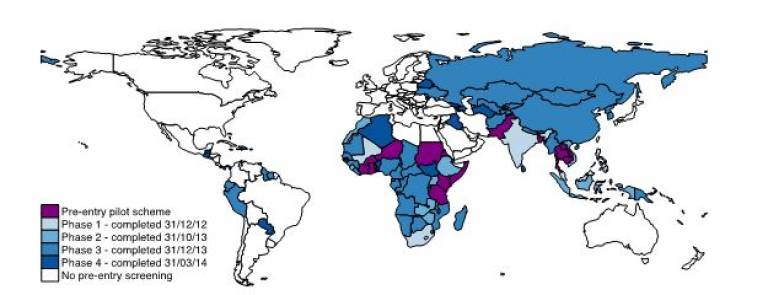The Problem
In many high-income countries such as the UK, an increasing proportion of all tuberculosis cases are detected in people born elsewhere. A better understanding of the epidemiology of tuberculosis in migrants and how well targeted tuberculosis screening programmes work is therefore a UK Government priority.
Our Research
This Research aimed to inform the development of evidence-based migrant screening by examining the epidemiology of tuberculosis in migrants screened by a pilot pre-entry programme (i.e. screening conducted before migration). Four major studies were conducted as part of this research programme.
The first was a systematic review to identify and analyse all existing studies on pre-entry screening. This review found 15 published studies containing data on 3,739,266 migrants. The second study was the first to examine data from the pilot UK pre-entry screening programme for tuberculosis. Data were analysed on 476,455 migrants between 2005 and 2012 and found that on average for every 100,000 migrants screened, 92 cases of tuberculosis were detected.
Previously it has not been possible to look what happens to these screened migrants after they arrive in the UK as no data were systematically collected and no unique identifying variable was available to link screening records with UK cases of tuberculosis. The third study therefore examined the validity of a software tool used to identifying individuals based on their demographic details such as names, dates of birth, country of origin and sex. The software was found to be highly accurate and specific and therefore was used to link pre-entry screening records with UK tuberculosis data.
The final piece of research created a cohort of migrants entering the UK between 2005-2012 and identified the rates of tuberculosis after the screening using the newly validated linkage software. The study found several groups were at higher risk of developing tuberculosis after arrival including those who had a chest X-ray that was suspicious of tuberculosis but subsequent tests were all negative, and those from countries with higher levels of tuberculosis remained at higher risk. However, the study also found that pre-entry screened migrants pose a negligible public health risk in terms of transmission of the tuberculosis to the UK population, even though their personal risk of developing disease was higher.

Figure: Location of UK pre-entry screening sites globally.
Themes
People
- Robert Aldridge
- Andrew Hayward
Collaborators
The research was carried out in close collaboration with Public Health England and the International Organization for Migration.
Publications
Aldridge, R.W., Zenner D, White P.J., et al. Prevalence and risk factors for active tuberculosis in migrants screened pre-entry to the UK: a population-based cross-sectional study. Lancet Infect Dis 2016. Published Online: 21 March 2016.
Aldridge, R.W., Shaji K, Hayward AC, Abubakar I. Accuracy of Probabilistic Linkage Using the Enhanced Matching System for Public Health and Epidemiological Studies. PLoS One. 2015 Aug 24;10(8):e0136179. doi: 10.1371/journal.pone.0136179
Aldridge, R.W., Zenner, D., White, P. J et al. Pre-entry screening programmes for tuberculosis in migrants to low-incidence countries: a systematic review and meta-analysis. Lancet Infect Dis 2014; 14(12):1240–49.
As part of this research Rob Aldridge received first prize for Young Investigator competition 2016 Spring Meeting for Clinician Scientists in Training. http://www.farrinstitute.org/news/199/2016-02-26/farr-researcher-receives-the-lancet-young-investigator-award-2016-.html
Podcast for the systematic review, published in The Lancet Infectious Diseases (http://thelancet.com/pb/assets/raw/Lancet/stories/audio/laninf/2014/laninf_141107.mp3)
 Close
Close

